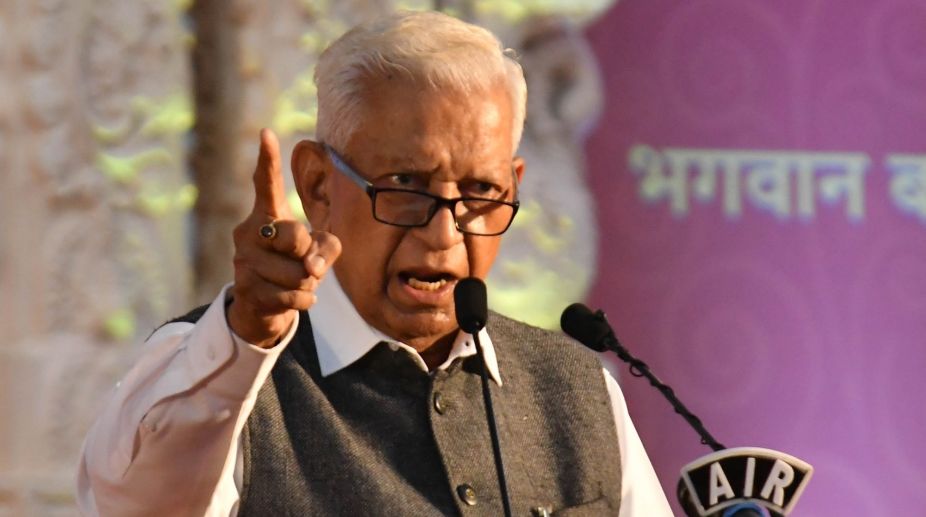The Governor of Karnataka has lowered the prestige of his position. It was certainly not the first time this has happened, but the manner in which he bowed to the dictates of Modi and Shah is really deplorable and amounts to maligning of the constitutional institution. Here’s a report, for Different Truths.
According to the Sarkaria Commission, the largest single party can stake a claim to form the government only with the support of others, including “independents”. But in Karnataka as well as the other states of Goa, Manipur, and Meghalaya, the BJP did not have the support of other parties. This would have made the Governor invite the Congress-JDS alliance to form the government. But he did not follow the constitutional practice that had been set precedent in Goa, Manipur, and Meghalaya.
In Goa, Governor Mridula Sinha invited the post-poll alliance led by BJP to form the government and ignored the Congress, which was the single largest party. Incidentally, when the Congress approached the apex court, it sought to know from the Congress why they wasted time by not coming earlier to them.
In the case of Goa, while rejecting the Congress’s objection on March 14, 2017, the Supreme Court had ordered a floor test to be held in two days. But in Karnataka, the Governor invited Yeddyurappa and asked him to prove his majority in 15 days. This was obviously meant to give the chief minister time to convert the number 104 into 111.
The Governor has lowered the prestige of his position. It was certainly not the first time this has happened, but the manner in which he bowed to the dictates of Modi and Shah is really deplorable and amounts to maligning of the constitutional institution.
From the beginning of the electoral procedure in Karnataka, the opposition parties have been found faltering. They could not evolve e a foolproof mechanism to counter the BJP, truly speaking Modi and Shah. The two leaders have had the Opposition on the run.
The result of the Karnataka assembly elections has put a big question mark on the agility and competence of the anti-BJP forces. The tacky manner in which the election was fought leaves no hope that the Opposition parties could even present a façade of unity against the BJP in the 2019 Lok Sabha elections. With Amit Shah in command, it would be a tough task for the anti-BJP forces to penetrate their fortress.
Rahul Gandhi and his brand of politics are rightly being blamed for helping BJP to emerge the winner in Karnataka. It cannot be denied that the Congress lacks a concrete strategy to defeat the BJP. It primarily depended on the strategy drawn up by chief minister Siddaramaiah. No doubt he was the man on the ground. But the Congress aspiring to defeat the BJP cannot leave the command in the hands of Siddaramaiah. The Congress leadership should have explored the possibility of putting a united fight. But it did not happen.
If Congress failed, others also could not keep their promise. Mayawati did most of the damage to the Congress. Even after being aware that her party BSP was a non-entity in Karnataka and it would only damage the prospect of the Congress, she jumped into the fray. As if this was not enough, she entered into an electoral alliance with the Deve Gowda’s JD(S). She campaigned against the Congress. The result was on predicted lines: the Dalit votes shifted away from the Congress.
What was most unfortunate was that Sitaram Yechury could not come up with any plan to unite the opposition forces against the BJP. If Rahul miserably failed to bring around the opposition forces with the Congress, Yechury too could not succeed. There is little doubt that the ego of the leaders acted as a stumbling block. Yechury’s political stature would have gone up if he had taken the initiative to bring the anti-BJP forces on one platform.
With the path cleared for building up all-out unity against the BJP at the Hyderabad Congress, Yechury could have used the spirit of the resolution to bring the Left forces on the centre stage of the Indian politics. He was expected to play a leading role in both cementing the unity of anti-saffron forces as he had done in the past.
What is happening in the post-election scenario is a caution to the opposition parties to ignore their personal differences. We have seen how the communist parties have been indulging in polemical fights without making any significant gains. Congress is often projected as the principal enemy of the BJP, although the communist and secular forces have been the real threat to BJP. The fact is the opposition itself has to be blamed for the success of the BJP. The opposition parties ought to take a lesson from the 2014 victory of the BJP.
Arun Srivastava
©IPA Service
Photo from the Internet





 By
By

